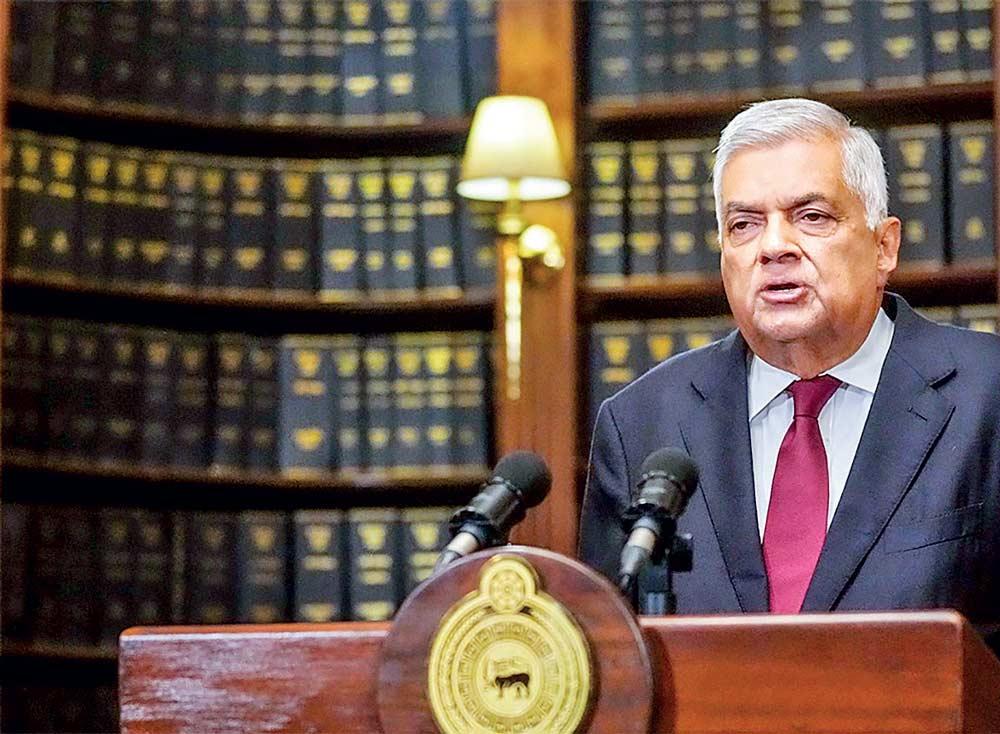The Economic Helmsman who steered through crisis
Posted on September 1st, 2025
Courtesy The Daily Mirror

For Sri Lanka to overcome its current economic difficulties and bring about prosperity to its citizens, maintaining the trajectory established during Wickremesinghe’s leadership remains crucial. (FILE PHOTO)
With Sri Lanka’s economy collapsing under Gotabaya Rajapaksa in 2022, the country faced unprecedented hardship, threatening society
The Former President, Ranil Wickremesinghe, utilised the experience that he had assimilated throughout his extensive political career, with invaluable insights into crisis management and debt restructuring
Leaders from opposition political camps recognise why Ranil’s policies are important and do not try to stray away from them, which, if done, can lead to dangerous consequences
 In the annals of Sri Lankan political history, few leaders have faced the daunting challenge of navigating a nation through complete economic collapse. Former President Ranil Wickremesinghe stands as a unique figure who has twice assumed the monumental responsibility of rescuing Sri Lanka from its worst economic crises—first in 2001 when the economy dropped below zero under CBK, and again in 2022 under Gotabaya. Despite holding just one parliamentary seat during the latter crisis, Wickremesinghe demonstrated the rare combination of expertise and courage required to pull a nation back from the brink of economic catastrophe.
In the annals of Sri Lankan political history, few leaders have faced the daunting challenge of navigating a nation through complete economic collapse. Former President Ranil Wickremesinghe stands as a unique figure who has twice assumed the monumental responsibility of rescuing Sri Lanka from its worst economic crises—first in 2001 when the economy dropped below zero under CBK, and again in 2022 under Gotabaya. Despite holding just one parliamentary seat during the latter crisis, Wickremesinghe demonstrated the rare combination of expertise and courage required to pull a nation back from the brink of economic catastrophe.
Ranil’s early experience provided him with invaluable insights into crisis management and debt restructuring. The lessons learned during the 2021 period would prove instrumental two decades later when Sri Lanka faced an even more severe economic meltdown.
When Sri Lanka’s economy imploded under the Gotabaya Rajapaksa administration in 2022, the country was plunged into unprecedented hardship that threatened the very fabric of society. Citizens endured hours-long queues for fuel and cooking gas, transforming daily life into a constant struggle for basic necessities. Entire neighbourhoods remained without electricity for up to eleven hours daily, crippling businesses and disrupting education. Ships laden with essential goods sat idle at Colombo harbour, unable to unload their cargo due to an acute shortage of foreign currency that had brought international trade to a virtual standstill.
The crisis had reached such severity that many political leaders hesitated to take responsibility, recognising the enormous challenges that lay ahead. It was during this zenith of economic collapse that Wickremesinghe stepped forward to shoulder the burden of national recovery for the second time in his career, demonstrating the kind of political courage that separates true statesmanship from ordinary politics.
According to former Treasury Secretary Mahinda Siriwardana, who worked closely with Wickremesinghe during this tumultuous period, the former president demonstrated exceptional leadership during the most challenging economic circumstances in the country’s history. I learned a lot from Ranil,” Siriwardana stated, emphasising the valuable knowledge he gained under Wickremesinghe’s guidance. I worked the longest with Ranil Wickremesinghe. He managed the economy during its most difficult period,” Siriwardana noted in a recent televised interview.
Siriwardana’s testimony provides valuable insight into Wickremesinghe’s sophisticated approach to crisis management, refined through his experiences in both 2001 and 2022. Under his leadership, the former Treasury Secretary learned how to make decisions during crises and how to see through their implementation”. This hands-on mentorship proved crucial during complex international transactions and debt restructuring negotiations, where Wickremesinghe provided what Siriwardana described as exceptional leadership”.
Wickremesinghe’s economic management strategy, deep understanding of international financial markets, honed over decades, allowed him to navigate sovereign debt restructuring with unprecedented skill. The former president’s ability to guide negotiations with other nations became particularly evident during Sri Lanka’s debt restructuring process, where his diplomatic finesse and technical expertise proved invaluable. What sets Wickremesinghe apart is his unique ability to learn from each crisis and apply those lessons to subsequent challenges. The methodologies he developed in 2001 were refined when applied to the more severe 2022 crisis, demonstrating his capacity for adaptive leadership in economic management.
Perhaps most remarkably, Wickremesinghe’s economic stewardship has earned praise from across the political spectrum. Minister of Agriculture K.D. Lal Kantha, one of the most senior members of the Janatha Vimukthi Peramuna (JVP) in the current cabinet, offered a candid assessment of Wickremesinghe’s unique capabilities.
When the economy had collapsed, Ranil Wickremesinghe came in and managed things within this system. That’s a fact. At that moment, there was no one else in Sri Lanka who could have done it,” Lal Kantha stated during a YouTube programme. This admission is particularly significant, coming from a member of a party that has historically opposed Wickremesinghe’s economic philosophy.
Lal Kantha drew comparisons with other former presidents, noting that while leaders like Mahinda Rajapaksa possessed skills in managing society and political situations, they lacked the specific expertise required to handle such severe economic crises. He characterised Wickremesinghe as someone deeply connected to the current economic system,” describing him as its clear leader”.
The fact that leaders from opposing political camps recognise the necessity of maintaining these policies speaks volumes about their effectiveness and the dangerous consequences that could arise from abandoning them. The stabilisation framework established by Wickremesinghe includes crucial elements such as fiscal discipline, monetary policy reforms, and structural adjustments that have gradually restored confidence in Sri Lanka’s economy. These policies, though sometimes politically unpopular in the short term, have proven essential for long-term economic stability. The current administration’s commitment to continuing these measures demonstrates a mature understanding that economic recovery requires sustained policy implementation rather than populist reversals.
For Sri Lanka to fully emerge from its economic difficulties and build sustainable prosperity, maintaining the trajectory established during Wickremesinghe’s leadership remains crucial. The policies that brought the country back from the brink of economic collapse must be preserved and refined, not abandoned for short-term political gain.
Lal Kantha’s assessment places Wickremesinghe in a historical context, suggesting that after President J.R. Jayewardene, he represents the most significant figure produced by this system.” This evaluation transcends party politics, acknowledging Wickremesinghe’s unique position in Sri Lanka’s economic landscape.
Today, as Sri Lanka continues its path toward economic recovery, maintaining Wickremesinghe’s policy framework remains crucial. His legacy as the leader who twice prevented deeper economic catastrophe serves as both a historical record and a practical guide for future economic management. The country’s continued adherence to the principles he established will determine whether Sri Lanka achieves lasting stability or risks sliding back into the chaos from which he rescued it—twice!
(The writer can be reached at kksperera1@gmail.com)